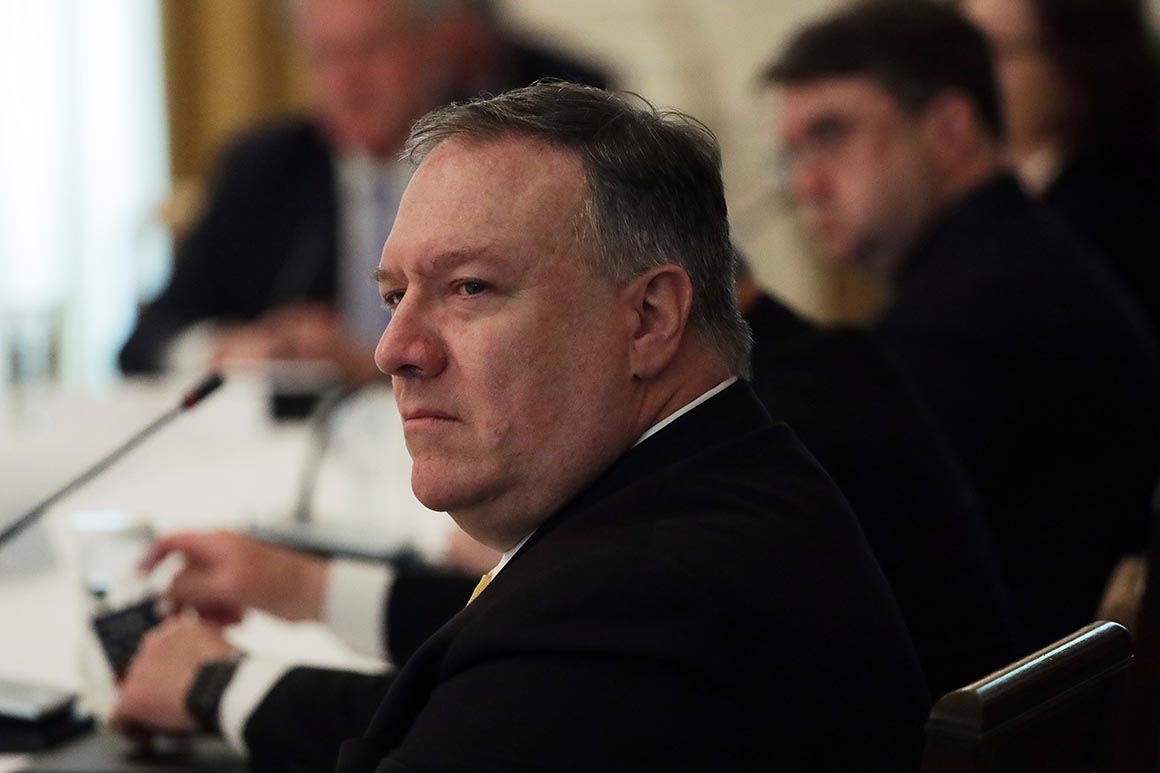
Meanwhile, State Department employees who were interviewed for ongoing and past investigations – often under conditions of anonymity – are worried that Akard will track down their identities and share them with Pompeo and others. They fear they will be targeted for professional retribution as a result.
“I spoke with investigators, and they assured that the names will not be revealed,” one employee told POLITICO. “We should be granted this protection. I hope that the IG’s office will adhere to the standards.”
Another State Department staffer predicted that colleagues will shy away from reporting future cases of wrongdoing at the department because of Akard.
“Things will go unnoticed and things will go unchallenged,” the staffer said. “People are going to be fearful because they don’t want their name to show up in the president’s Twitter feed.”
While Akard’s relationship with Pence and position in the State Department’s hierarchy have raised concerns, staffers are aware that he previously served as a Foreign Service officer – doing stints in places like India and Belgium – and so might have a sense of the challenges they face.
Pompeo has acknowledged asking Trump to fire Linick but denied that he did so to retaliate over any investigations that affected him or his wife. He’s complained instead about leaks that he suspected came out of the inspector general’s office, though there’s no publicly known proof the office or Linick were the source of the leaks.
In a Thursday interview with Fox News, Pompeo indirectly made it clear what he would like to see in an inspector general when he hinted that Linick was too independent.
“He was acting in a way that was deeply inconsistent with what the State Department was trying to do,” Pompeo said of Linick. “We tried to get him to be part of a team that was going to help protect his own officers from Covid-19; he refused to be an active participant. He was investigating policies he simply didn’t like. That’s not the role of an inspector general … This was about an IG who was attempting to undermine the mission of the United States Department of State. That’s unacceptable.”
A representative for Linick, who had served as the inspector general since 2013, did not immediately respond to requests for comment on Pompeo’s assertions. But the fact that the chief U.S. diplomat has been so public about what he views as the proper role of an inspector general worries staffers who fear Akard will internalize the message.
There also are concerns on Capitol Hill and beyond that Akard will seek ways to undermine Linick’s past, completed investigations that may have upset Pompeo and some of his top aides.
One such investigation determined that top political appointees in the State Department had acted inappropriately in pushing a U.S.-born civil servant out of her job in the Policy Planning office, and that her Iranian ancestry may have played a role.
While Pompeo was not secretary of State at the time, one of his current top aides, Brian Hook, was involved in the case, and the inspector general recommended he be punished. Pompeo has refused to move against Hook, who serves as his envoy for Iran issues. Hook has been furious with Linick over the report.
This week, in what may be the start of a campaign in the conservative media, a site called The Federalist published an item alleging that Linick had gone too far in a separate but linked investigation into political retaliation against career employees.
In that investigation, Linick determined that top political appointees in the State Department’s international organizations bureau had engaged in “disrespectful and hostile treatment” of career staffers, and that they’d constantly questioned the loyalty of some of those government employees.
One of the political appointees singled out for criticism by Linick was Kevin Moley, the head of the bureau. Even though some of Pompeo’s top aides acknowledged many of the problems described in Linick’s report, they claimed the secretary of State had no power to fire Moley because he was a presidential appointee. Instead, Moley was allowed to quietly retire several weeks later.
(The State Department has never responded to questions from POLITICO about whether Pompeo had ever asked Trump to fire Moley. He did do so for Linick, who also was a presidential appointee.)
The Federalist, a conservative pro-Trump website, defended Moley as a military veteran who was simply trying to implement the policies of the president, alleging that through his investigation Linick had “undermined U.S. foreign affairs at a critical time.” It also drew a comparison to former special counsel Robert Mueller’s probe of Russia’s role in the 2016 election, an investigation many Trump supporters insist was a sham.
State Department employees and congressional aides are wondering now if Akard will make moves similar to Attorney General William Barr’s efforts to undermine the credibility of Mueller’s investigation.
Akard may be prevented by government rules from rescinding past reports. But he could, like Barr, initiate reviews of past investigations in a bid to question their soundness, undermining the public’s faith, not to mention his staff’s morale.
“Everyone’s on alert,” one State Department official said about the overall mood.
Technically, Linick’s firing doesn’t take effect until 30 days have passed. But Linick is reported to have been barred from his office, and Akard has started his new duties.
Given the upcoming presidential election, it’s unlikely Trump will soon nominate anyone else to serve as the permanent inspector general, meaning Akard could keep the role for several months.
Source: politico.com
See more here: news365.stream






